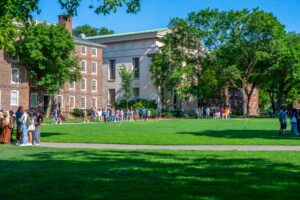Much like colleges, you can become a well established and qualified lawyer regardless of where you go to law school. Also like college, however, certain law schools give you a massive advantage when it comes to finding positions in the legal field; the Supreme Court, for instance, almost uniformly attended Ivy League law schools.
In this article, we’ll look at which undergraduate colleges best advantage their students when applying to top legal programs. This is not about the application process itself; see our guide to law school applications for that. Instead, the point is to examine which undergraduate schools will best position you to attend a top law school. Let’s get started!
What Makes a Top Law School?
This is a reasonable question; sure there seems to exist a consensus that certain law schools are better than others, but what does that really mean? In general, the legal profession is based on reputation, connections, and networking to an incredible degree, and top law schools have the biggest advantage in this area.
Recruiting
Certain firms, internships, and clerkships recruit specifically from certain law schools. Many judges recruit interns from their alma mater as a way of giving back; this is why Supreme Court clerks almost universally come from Yale and Harvard. Top law schools are able to consistently offer opportunities to students to network with top legal prospects.
Job Placement
On top of recruiting, top law schools send the majority of their graduates on to established careers in the legal profession, representing all kinds of fields. This may surprise you, but a law degree on its own does not guarantee employment; a law degree from a top school also doesn’t, but it’s much more of a sure thing.
Selectivity
Just like top colleges, one of the factors that makes a top law school is how selective they are with their admissions decisions. The more people who want to attend that law school, the better it must be, right? While we can’t say for certain if this is correct, it does impact how law schools are viewed, and which are counted as the best programs in the country.
While attending a top legal program is not necessary, it can advantage you significantly in pursuing specific legal careers, especially in the judiciary and working with top law firms. If your goal is attending one of these top programs then, then you want to attend an undergraduate school which will best position you to do so.
Top Law School Feeder Programs
Here is a collection of the colleges which send the most graduates to top legal programs. The data for this comes from LinkedIn, and is thus not comprehensive, but does show trends. We have adjusted the data to compensate for the size of the undergrad class at these schools, else larger schools would lead on this list just due to the number of graduates they have.
Unlike medical feeder schools, we cannot include placement rate in this article. Most of these schools have no set pre-law major or program; indeed, students interested in law can major in almost anything (though some are more popular). For this reason, colleges have no real way to track how many of their graduates who intended to attend law school actually ended up attending law school.
| College Name | Students in a Top JD Program | #1 Destination of Graduates |
| Yale | 3,079 | Harvard Law School |
| Amherst College | 685 | Georgetown University Law Center |
| Harvard | 3,651 | Harvard law School |
| Princeton | 1,918 | Harvard Law School |
| Stanford | 2,336 | UC Berkeley School of Law |
| Dartmouth | 1,398 | Harvard Law School |
| Williams College | 611 | Harvard Law School |
| Duke | 1,889 | Duke University School of Law |
| Columbia | 2,241 | Columbia Law School |
| Georgetown | 1,805 | Georgetown University Law Center |
| Swarthmore College | 352 | Harvard Law School |
| Haverford College | 295 | Harvard Law School |
| Brown | 1,480 | Harvard Law School |
| Pomona College | 320 | UC Berkeley School of Law |
| St. John’s College | 63 | Harvard Law School |
| UPenn | 2,054 | University of Pennsylvania Carey Law School |
| Claremont Mckenna College | 227 | UC Berkeley School of Law |
| Wesleyan University | 507 | Georgetown University Law Center |
| Wellesley College | 414 | Harvard Law School |
| Northwestern | 1,320 | Northwestern University Pritzker School of Law |
| Cornell | 2,220 | Cornell Law School |
| UChicago | 965 | University of Chicago Law School |
| Brandeis | 480 | University of Pennsylvania Carey Law School |
| Carleton College | 273 | Georgetown University Law Center |
| UC Berkeley | 3,570 | UC Berkeley School of Law |
| Vassar College | 279 | Georgetown University Law Center |
| Notre Dame | 968 | Georgetown University Law Center |
| Colgate University | 332 | Georgetown University Law Center |
| University of Virginia | 1,866 | University of Virginia School of Law |
| Washington and Lee University | 198 | University of Virginia School of Law |
You may notice, looking at this table, that the numbers do not appear to proceed in order. This is because they are organized as a success rate in proportion with the school’s number of graduates generally, thus putting colleges of significantly different sizes on more equitable comparative footing.
For example, Haverford has 295 students at top JD programs, despite a graduating class size of around 280 each year. Brown has 1,480 students at top JD programs, despite a graduating class size of around 1,240 each year. While Brown manages to place many more students in top programs, they also have a much larger pool of students trying to go to law school in the first place.
By doing this, we hope to bring your attention to some smaller colleges that you may otherwise miss, but still send a statistically significant number of students on to top law schools.
The other thing you may note is just how many students are attending Harvard’s Law School. This is the number one destination for a lot of graduates. This does not mean that an absolute majority of students from each school get into Harvard, but instead that it is the destination where more graduates enroll than anywhere else.
There are a few reasons for this popularity, but the main one is how highly regarded Harvard’s Law School is. It is regularly regarded as one of the top schools in the country, and also one of the most famous (Legally Blonde takes place there, among other pop culture highlights).
Does Attending an Attached Law School Give You an Admissions Advantage?
While we do see a lot of students trying to attend Harvard Law, a significant number stay closer to home, choosing to attend the law school attached to the university where they attended undergrad. Of course, this doesn’t apply to the liberal arts colleges on the list, but it does raise an important question: do you have an admissions advantage if you are attending an associated law school?
As with many admissions questions, the answer to this is nuanced. The truth is it does, but not because it is an attached institution. Instead, it helps because many law school admissions committees are incredibly concerned with the name brand and prestige of the undergraduate institution you attend.
At many top law schools, the vast majority of accepted students come from a select list of undergraduate institutions. These students still have excellent grades and LSAT scores of course, but the prestige of attending one of these well known institutions is what pushes their application over the edge.
This holds true outside of top law schools as well, with applicants from certain undergraduate institutions having a minor boost at many of the law schools in the top 50. There is a perception that many of these top schools just trade their undergraduates back and forth for graduate programs, including law school. While this is not always the case, it is founded in reality in many instances.
Applying to a law school attached to your own college can have this boost as well, if undergraduates from your school are known to do well in law school. You are judged on the reputation of your peers, not just your own base statistics. Attending any of the thirty schools in the list above will advantage your applications in this way.
How Should This Impact You?
You can go on to do interesting and rewarding things in law without attending a top law school. That said, there are some opportunities which are more readily available, or only available, to graduates of these top programs. If these are one of your goals, then you should definitely consider attending a feeder program for undergrad.
You may note that many of these feeder schools are also quite competitive for undergraduate admissions. This is, perhaps, not surprising; the difficulty of admissions is a key source of prestige for both colleges and law schools. That said, it is another barrier of entry to the legal profession.
If you are planning on a legal career path, you may want to begin planning early, by determining what undergraduate school will best support your ends. Check out our guide to law school admissions for more detailed advice on a choice of major, and how that can impact your journey.
Final Thoughts
Law is an ancient and prestigious field, if sometimes (perhaps even frequently) maligned in popular culture. The top law schools in the country have been in operation for quite some time, and have a long history of turning out legal scholars and judges of the highest caliber.
We hope that this article has given you insight into how the college you attend can impact your chances of matriculating at a top law school. While prestige maybe should not be such a big factor in law school admissions, that does not change the fact that it is. Of course, applying to these colleges is a challenge in and of itself. If you want advice on this, or how you can begin preparing for law school already, schedule a free consultation today. We have a long history of helping students with every step of their educational journey, and are always happy to hear from you.








